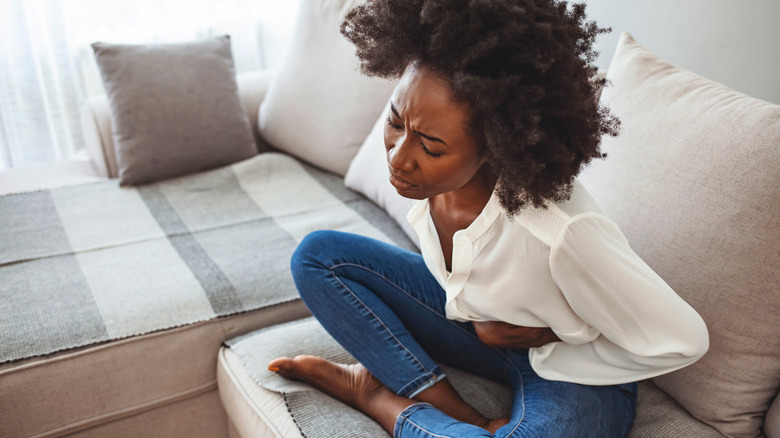The Vitamin You Need If You Have Cramps
Premenstrual syndrome (PMS) can cause a wide range of symptoms that affect both your inner well-being and physical health (per Mayo Clinic). From anxiety, irritability, and crying spells to weight gain, acne, and cramping, 75% of women who menstruate experience some form of PMS.
About 5% of women who have a period experience a worse form of PMS called premenstrual dysphoric disorder (PMDD), according to the U.S. Department of Health & Human Services Office on Women's Health. Though research has yet to pinpoint the exact cause of PMDD or PMS, a change in serotonin levels may be the culprit. A big difference between PMS and PMDD is that women with PMDD suffer from at least four physical symptoms and one emotional affliction. Considering the severity of PMDD, antidepressants are typically prescribed for treatment. Birth control, over-the-counter pain relievers, and stress management techniques are also recommended. In addition, certain vitamins can help with both physical pain and emotional distress.
These 3 vitamins can help with PMS
Vitamin B12 can relieve period pain because of how it caters to replenishing blood cells, Suzie Welsh, founder and CEO of the supplement company Binto, told The Thirty. According to Welsh, vitamin B12 is especially beneficial when coupled with fish oil which is rich in omega 3. For plant-based dieters, Eating Well suggests flax seeds, walnuts, seaweed, algae, canola oil, hemp seeds, edamame, kidney beans, and chia seeds as sufficient sources of omega 3. Vitamin B12 can be found in yogurt, cheese, eggs, plant-based milk, fortified breakfast cereals, and nutritional yeast (per Medical News Today).
Vitamin E also can help relieve PMS symptoms, especially if you experience tender breasts during your cycle (via Everyday Health). Vitamin E can be found in nuts, seeds, and vegetable oils.
When it comes to managing mood swings caused by PMS, Healthline recommends vitamin B6 because it helps with the production of neurotransmitters. Chickpeas, potatoes, and starchy vegetables are good sources of vitamin B6.


